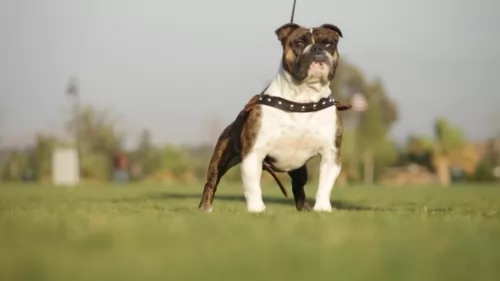 Petzlover
Petzlover Bantam Bulldog is originated from United Kingdom but Tibetan Spaniel is originated from China. Bantam Bulldog may grow 6 cm / 3 inches higher than Tibetan Spaniel. Bantam Bulldog may weigh 13 kg / 29 pounds more than Tibetan Spaniel. Both Bantam Bulldog and Tibetan Spaniel has almost same life span. Both Bantam Bulldog and Tibetan Spaniel has same litter size. Bantam Bulldog requires Low Maintenance. But Tibetan Spaniel requires Moderate Maintenance
Bantam Bulldog is originated from United Kingdom but Tibetan Spaniel is originated from China. Bantam Bulldog may grow 6 cm / 3 inches higher than Tibetan Spaniel. Bantam Bulldog may weigh 13 kg / 29 pounds more than Tibetan Spaniel. Both Bantam Bulldog and Tibetan Spaniel has almost same life span. Both Bantam Bulldog and Tibetan Spaniel has same litter size. Bantam Bulldog requires Low Maintenance. But Tibetan Spaniel requires Moderate Maintenance
 The origin of the Bantam Bulldog goes back to the 1800s, and in fact there is evidence of miniature bull dogs in 1899, In 1902 the smaller bulldog breed was facing extinction, so that it became necessary to import French bulldogs to England to help restore the bantam bulldog breed.
The origin of the Bantam Bulldog goes back to the 1800s, and in fact there is evidence of miniature bull dogs in 1899, In 1902 the smaller bulldog breed was facing extinction, so that it became necessary to import French bulldogs to England to help restore the bantam bulldog breed.
It was only in 2002 that the United Canine Association recognized the English bantam bulldog.
They’re the same as the ordinary bulldog except they are lighter and shorter, although there are slightly larger ones which are as tall as a regular bulldog.
The Bantam bulldogge is related to the English and French bulldogs so that the standards for the bantam breed has similarities to both types.
 Known fondly as the Tibbie and being referred to as little lions’, the Tibetan Spaniel is an ancient dog breed.
Known fondly as the Tibbie and being referred to as little lions’, the Tibetan Spaniel is an ancient dog breed.
They appear in ancient art dating way back to 1100BC. This tells you that this small dog has been around for a jolly long time.
When you look at him, you can see that his predecessors were the Pekingese and the Lhaso Apso. It’s odd actually that he is called spaniel, as he doesn’t look like a spaniel at all and he has certainly never been a gun dog. He is more of a companion breed.
Even today, you’ll find these dogs living with monks in monasteries. The American Kennel Club recognized the breed in 1984.
 The breed has its origins with the English bulldog, but it was in 2011 that the ‘English’ was abandoned and the name of the dog changed to Bantam Bulldogge. Short to medium in height, and with his large, square head and broad, short muzzle, the dog is short, strong, stout and compact. He had wide apart eyes, short, half-pricked, half-floppy ears and the front legs are also strong and set wide apart.
The breed has its origins with the English bulldog, but it was in 2011 that the ‘English’ was abandoned and the name of the dog changed to Bantam Bulldogge. Short to medium in height, and with his large, square head and broad, short muzzle, the dog is short, strong, stout and compact. He had wide apart eyes, short, half-pricked, half-floppy ears and the front legs are also strong and set wide apart.
He is fit and active with a playful, jovial personality. The Bantam Bulldog is completely at ease with his human family and welcomes visitors to the home. He forms strong bonds with everyone in the family and loves the presence of children in the home too. As with most other dog breeds, he does well with training and socialization – it just makes him a better dog all round. He doesn’t have a problem with accepting other pets in the home.
The coat of the Bantam is short, dense and straight with the skin being tight to the body but looser around the head and neck. Both head and face have moderate wrinkles. The coat is available in all colors and is low maintenance. A good brush twice a week won’t only remove loose hairs and keep his short coat glossy, the mere act of brushing him strengthens the bond between you as well.
 Weighing between 4 to 7kg and standing at 23 to 30cm, the silky, double coat is fairly long and it sheds throughout the year.
Weighing between 4 to 7kg and standing at 23 to 30cm, the silky, double coat is fairly long and it sheds throughout the year.
The coat can be any color really, from tan to cream to brown and black and even a mix of colors.
The eyes are dark brown, the ears medium length and feathery and the tail is long and feathery too. The nose is fairly short and blunt.
The Tibetan spaniel is a small, active dog breed but not known to be shy or timid. He is an assertive dog, and intelligent too.
He would be better off having training and socialization as he is strong willed, stubborn and independent. He is loving, sweet and devoted to his owners.
He makes a good watchdog dog and will adapt well to life in the city or in the countryside. He can be both social and aloof, enjoying having his human family around him even though he may not be interacting with them.
He is playful and gets on well with children in the home as well as with other pets. He makes an excellent pet for older people too – he just needs to get his regular exercise.
 The Bantam Bulldog is full of personality and is active, friendly and social. He is an adaptable pet and will happily live with his human family in an apartment or in a home with a garden. Patient and tolerant, he responds well to the voice of his owner and simple commands are no problem with him as he is quick to learn and to please.
The Bantam Bulldog is full of personality and is active, friendly and social. He is an adaptable pet and will happily live with his human family in an apartment or in a home with a garden. Patient and tolerant, he responds well to the voice of his owner and simple commands are no problem with him as he is quick to learn and to please.
He is never going to be much of a guard dog for you, but he will be a happy, contented, loyal and devoted companion who just wants to be as close to you as he can.
 The Tibetan Spaniel dog is energetic and active, but doesn't require a lot of exercise. This makes him suitable for life in the city as well as the countryside.
The Tibetan Spaniel dog is energetic and active, but doesn't require a lot of exercise. This makes him suitable for life in the city as well as the countryside.
They’re social dogs and will relish any interaction with their human family. Give him the love and care he deserves and you’ll be rewarded with a loyal, loving friend.
 A happy dog is a healthy dog, but the happy Bantam Bulldog will be prone to certain ailments that are common to his breed
A happy dog is a healthy dog, but the happy Bantam Bulldog will be prone to certain ailments that are common to his breed
This breed of dog is prone to have hip dysplasia. Because of their genetic make-up, the soft tissues surrounding the joint develop abnormally and the disease can affect one- or both hips.
Bulldogs can also be prone to digestion issues which amounts to flatulence. This problem however, can be reduced significantly by giving your pet the best diet. Speak to your vet about appropriate foods for dogs with a sensitive stomach. With a sensitive stomach, you want to avoid dog foods with toxic colorants, artificial preservatives and artificial flavors.
Be aware of breathing problems with your bantam bulldog because flat-faced dog breeds such as this can battle with upper airway problems. Symptoms of an obstructed upper airway can include noisy breathing, panting, snoring, rapid breathing and coughing.
 Tibetan Spaniels are generally healthy, especially if you provide them with good food and exercise.
Tibetan Spaniels are generally healthy, especially if you provide them with good food and exercise.
Whenever you’re looking to buy a puppy, make sure that you do research on where the puppy comes from. You don’t want to bring your puppy home and find that you’re faced with a host of health problems.
This eye problem effects photoreceptor cells which deteriorate over time and ultimately lead to blindness. It is an inherited disease that occurs in quite a few different breeds of dogs.
Dogs with this disease should never be bred. It isn’t a painful condition but you usually notice it when your dog has night blindness. Day blindness also occurs and later on cataracts can develop too.
 Your Bantam Bulldog needs a lot of protein in his diet. In fact, the Association of American Feed Control Officials have suggested that the dog needs at least 22% of maintenance protein for puppies and 18% of protein for adult dogs. Speak to your vet about wet- and dry dog foods and which foods will suit this particular pet of yours. Always ensure cool, fresh water is within your pet’s reach.
Your Bantam Bulldog needs a lot of protein in his diet. In fact, the Association of American Feed Control Officials have suggested that the dog needs at least 22% of maintenance protein for puppies and 18% of protein for adult dogs. Speak to your vet about wet- and dry dog foods and which foods will suit this particular pet of yours. Always ensure cool, fresh water is within your pet’s reach.
The exercise needs of the Bantam Bulldog are minimal. He is never going to turn down a game of ball with the kids but you don’t have to take him on long walks or runs. He is a social pet, so even though you don’t have to be putting him through an exercise program every day, he doesn’t want to be left alone hour after hour, day after day.
 The Tibetan Spaniel isn’t fixated on games and exercise like some other dog breeds are, but even so he isn’t a couch potato either. He will certainly require some moderate exercise such as a good walk every day.
The Tibetan Spaniel isn’t fixated on games and exercise like some other dog breeds are, but even so he isn’t a couch potato either. He will certainly require some moderate exercise such as a good walk every day.
You canine friend relies on you to make good food choices for him. Just like human beings have to watch what they eat if they want to remain healthy, dogs can’t just eat anything.
Feeding him an inferior diet will allow sickness. Commercially manufactured dog foods should be chosen with care, and there is a lot of information on the packaging to guide you.
Getting enough minerals and vitamins is imperative for good health. You should also try to give him some simplistic home-made food, while steering clear of toxic foods that could give your pet a whole lot of digestive problems. These are things like chocolates, crisps, peanuts, grapes, onions and spicy, exotic foods.
Just stick to simple, nutritious foods such as boiled chicken, brown rice and vegetables.
• Tibetan Spaniels will benefit from early socialization and training because then they become obedient and well mannered to have around with you wherever you go.
• Get your pet to the vet when he’s sick. As it is, he will need vaccines against serious pet illnesses as a puppy.
• Provide general grooming – a brush twice a week, checking inside the ears for redness, checking the eyes and checking for any unusual lumps.